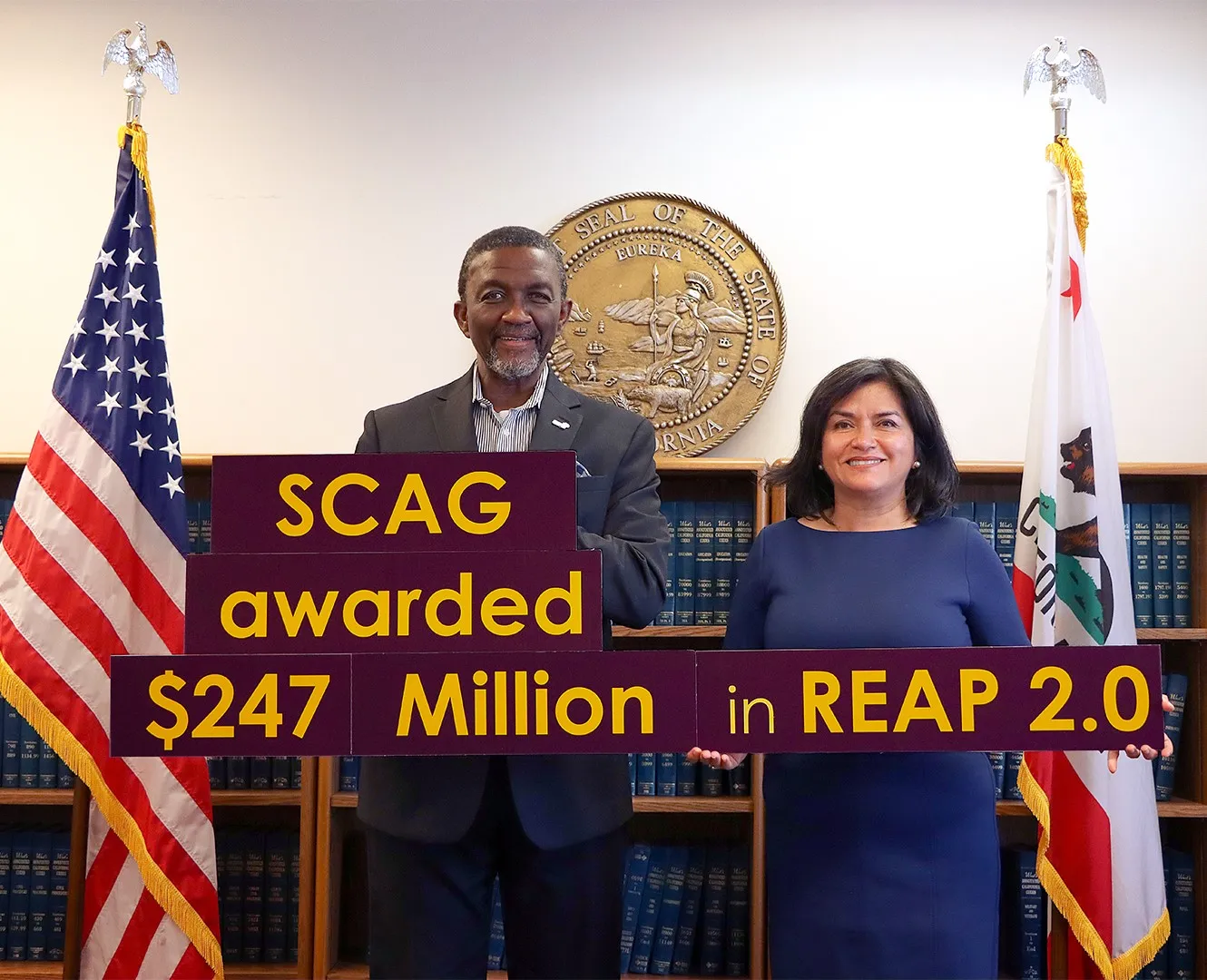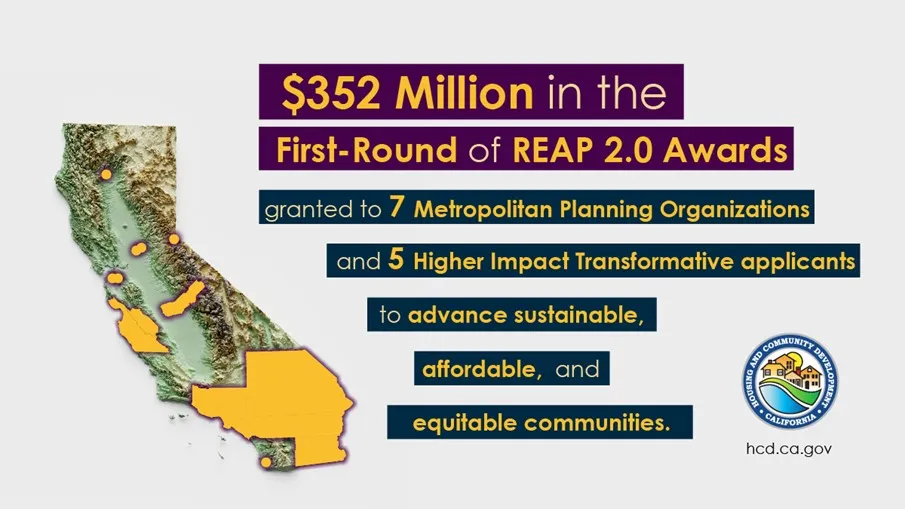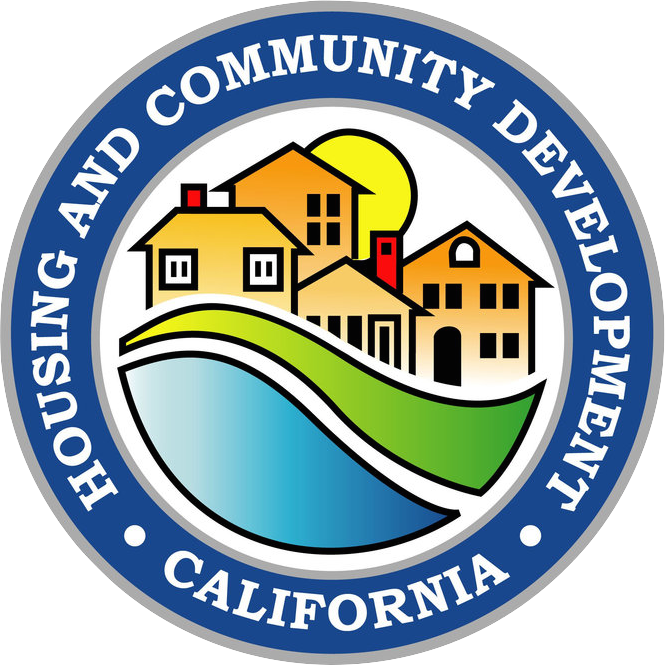California Department of Housing and Community Development Awards More Than $352 Million in First Round of REAP 2.0 Grants
Local and regional agencies will fund investments to advance sustainable and equitable communities and facilitate infill housing development
July 5, 2023

BCSH Secretary Lourdes Castro Ramírez and SCAG Director Kome Asije mark the historic investment in the SCAG region to build more climate friendly housing in areas that will reduce car-dependency and meet our state housing goals.
Sacramento, CA
The California Business, Consumer Services and Housing Agency announced today more than $352 million in the first round of funding from the Regional Early Action Planning grants program of 2021 (REAP 2.0).
REAP 2.0 is a flexible grants program that represents California’s commitment to a future where everyone has the option to live closer to jobs, services, and daily destinations. It provides planning and implementation dollars to create sustainable, resilient, and equitable communities that are inclusive and take strong strides toward reducing vehicle miles traveled.
“Abundant affordable housing is key to addressing the climate crisis,” said Business, Consumer Services and Housing Agency Secretary Lourdes Castro Ramírez. “California is proud to partner with local communities to build more affordable homes in the right places – near jobs, transit and neighborhood services–to mitigate the impact of climate change, improve people’s quality of life, and meet the state’s climate goals.”
Enacted as part of the California Comeback Plan, REAP 2.0 builds on the successes of the $125 million REAP 2019, while expanding the program’s focus by integrating housing and climate goals, and allowing for broader planning and implementation investments. This includes infrastructure investments that support infill development and facilitate housing supply and affordability.
The vast majority of $570 million in REAP 2.0 funds will flow to Metropolitan Planning Organizations (MPOs) statewide through an over-the-counter process; MPOs may then suballocate a portion to eligible local, regional, and tribal entities. A smaller set-aside of $30 million in REAP 2.0 Higher Impact Transformative (HIT) funding has been allocated through a highly competitive process to five awardees that have demonstrated a commitment to transforming disadvantaged neighborhoods in support of unique, innovative place-based projects.
“These highly competitive awards are going to communities that have demonstrated a strong commitment to transforming historically under-resourced communities,” said HCD Director Gustavo Velasquez. “High-impact REAP 2.0 grants will make possible the development of significant affordable housing near transit hubs, connecting vulnerable Californians to opportunity and moving the state toward its climate goals by reducing vehicle traffic.”

Awardees receiving a total of more than $322 million in the first round of REAP 2.0 MPO funding include:
Association of Monterey Bay Area Governments (AMBAG), which will split nearly $9.13 million in REAP 2.0 funds between two regional suballocation programs and a technical assistance program. AMBAG will provide 60 percent of its funding to a competitive grant program for local jurisdictions with the most high-impact and transformative projects. AMBAG will also directly suballocate 25 percent of the total award to all local jurisdictions based on Regional Housing Needs Assessment (RHNA) distribution to fund REAP 2.0-eligible implementation or planning projects. AMBAG will use the remaining funding to administer a technical assistance program for local jurisdictions to help increase planning capacity with the goal of advancing best practices for reducing vehicle miles traveled based on the regional Sustainable Community Strategy (SCS).
Madera County Transportation Commission (MCTC), which will spread out its $2.18 million award to the City of Chowchilla, the City of Madera, and the County of Madera to fund transformative projects that support disadvantaged communities, regional connectivity, and infill affordable housing along multimodal corridors.
Sacramento Area Council of Governments (SACOG), which will use its $31.83 million award to fund the Green Means Go program, providing one-time funding to local cities and counties for planning and capital infrastructure investments for non-transportation projects in locally adopted Green Zones (priority growth areas).
San Diego Association of Governments (SANDAG), which will split its $38.73 million award between affordable housing development, the establishment of an affordable housing trust fund, and three separate suballocation programs: one to local jurisdictions for planning and capital investment; one to transportation agencies for studies and predevelopment work to create mobility hubs; and one to tribal entities for predevelopment plans, studies, and outreach materials for housing proposals.
Shasta Regional Transportation Agency (SRTA), which will use its $2.24 million award to develop two infill sites for housing affordable to low- and moderate-income households and to make infrastructure improvements to provide greater connectivity and more transportation options in Downtown Shasta Lake.
Southern California Association of Governments (SCAG), which will receive the largest REAP 2.0 award to date, with $237.41 million supporting a wide range of projects. SCAG will contribute more than $99 million to Programs to Accelerate Transformative Housing (PATH) in support of a Notice of Funding Availability for Lasting Affordability; a Regional Utilities Supporting Housing Pilot Program; and a Housing Infill on Public and Private Lands Pilot Program. Another $100 million will go to the Transformative Partnership Program (TPP) to be split between its County Transportation Commission Partnership Program (CTC) and Regional Pilot Initiatives Program (RPI). SCAG will suballocate funds to cities and counties, based on population, to support the implementation of housing element programs and strategies that achieve all REAP 2.0 program objectives. Remaining SCAG REAP 2.0 funds will support the Sustainable Communities Program: Civic Engagement, Equity, and Environmental Justice (SCP: CEEEJ), as well as a major data purchase that will help local jurisdictions create a disadvantaged communities toolkit, a regional performance measurement dashboard of key regional performance indicators, and a centralized hub to engage and request information, technical assistance, and training on the tools and resources in the regional data platform.
Tahoe Regional Planning Agency (TRPA), which will use its $567,239 award to update density, height, and coverage regulations to facilitate multifamily development and accessory dwelling units, increasing housing supply, choice, and affordability in the region.
REAP 2.0 HIT awardees are:
City of Oakland, which will invest $10 million in REAP 2.0 funds in West Oakland around the Mandela BART Station. This includes conducting predevelopment activities for the Bay Area’s largest planned 100-percent affordable infill project, as well as installing infrastructure such as sewer lines that will support 2,705 units of housing (including 418 affordable units), 300,000 square feet of commercial space, and over 100,000 square feet of retail space adjacent to the Mandela BART Station. REAP 2.0 funds will also be used to complete the design phase for complete streets improvements on 7th Street and implement a "Universal Basic Mobility" transit fare subsidy program – providing prepaid debit cards for multiple transit agencies and mobility services for select West Oakland residents.
City of Rancho Cordova, which will receive a $4 million REAP 2.0 HIT award to make non-transportation infrastructure improvements that will support transit-oriented development around the Mather Mills Light Rail Station, which will facilitate the completion of 60 affordable housing units and 120 housing units total, with up to 400 homes and other community-serving uses anticipated in the project area.
Tahoe Regional Planning Agency (TRPA), which will use $2,412,475 in REAP 2.0 HIT funds to develop an environmental clearance process for infill multifamily developments and analyze and update the region’s Transfer of Development Rights and growth management programs to incorporate equity, address climate change concerns, and facilitate infill development.
SANDAG will invest $10 million along the Trolley Blue Line for Transforming and Advancing South County Transit Communities (TASC), which includes infrastructure investments to support a 483-unit transit-oriented affordable and middle-income housing project and other community serving uses (Palm City Transit Village), Capital Improvements to convert an automobile alleyway into a multimodal corridor linked to the trolley station by removing a vehicle lane for active transportation and arts, and establishing the Avanzando Community Land Trust of 103 units with 15-year rent-to-own opportunities for households with incomes that are 30-60 percent of the area median income.
BART will receive nearly $3.59 in REAP 2.0 HIT funds to establish a revolving loan fund to finance predevelopment activities for affordable housing projects on BART-owned land. The initial loan will be made to the Lake Merritt/Chinatown transit-oriented development senior affordable housing project as part of a larger place-based planning strategy in the area.
REAP 2.0 is administered by HCD in collaboration with the Governor’s Office of Planning and Research, the Strategic Growth Council, and the California Air Resources Board.


